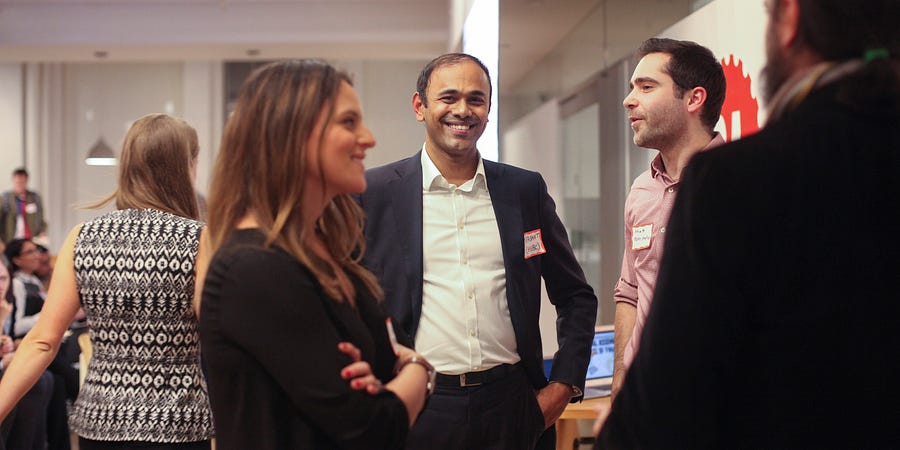Don’t be afraid to take risks, like introducing yourself to someone — in person — on a whim.
I still remember the early days of networking, before LinkedIn existed to help organize your professional life. When you’re fresh out of college, networking typically means going to happy hours, checking in with former classmates, and keeping in touch with mentors from your summer internships. But it’s the people who decide to go above and beyond college or corporate happy hours — with creative approaches to introductions — who can really stand out.
After you’ve been in the workforce for 15-plus years like I have, your networking strategy needs to evolve to place you in front of the right senior executives at innovative, cutting-edge companies. Remember that you are your own best publicist and it’s OK to be forward, ambitious, and scrappy to open the right doors. Don’t be afraid to take risks like introducing yourself to someone — in person — on a whim. Don’t hide behind LinkedIn connections online. Instead, create real, long-lasting relationships that will connect you with the biggest opportunities of your life.
Over the course of my career — which spanned 12-plus years at Viacom before I joined General Assembly—I’ve learned that cultivating meaningful relationships is a key to success. As the head of General Assembly’s Media, Tech, and Telecom team, I work with leadership at large enterprise organizations, as well as other startups, to help them source, assess, and train talent.
A few years back, I told my then-COO that I wanted to get paid to be a professional networker. I still sometimes pinch myself that I get paid to network, learn, and meet some of the most interesting leaders in business today.
Looking to crush your networking game? Here’s what I’ve learned over the years.

***
Contacts are everywhere — keep track of them.
You never know when someone you met at an event last week could become your future client or boss. It may be three years from now, but reconnecting will be easier when you remember how you first got in touch. LinkedIn is essential for keeping track of contacts, and before that existed I used an Excel spreadsheet. I simply included the person’s name, email address, what they do, how we met, who connected us, and what I was wearing or what they were wearing — something to spark a memory when I look back at it years later. I don’t rely on the spreadsheet heavily now, but it’s helpful as a reminder of how I made the initial connection. Plus, it was my secret weapon when I ran VH1 News and needed to reach out to the right person to gain immediate access to talent, brands, and events.
Go find those executives.
One of the easiest ways to get yourself in front of senior leadership is to attend industry events where they’re speaking as thought leaders. They’re more approachable than you’d expect. Attending senior-level industry events (like Advertising Week, South by Southwest, CES, and Code Media events) and speaker series (such as Variety or the Girls’ Lounge) shows that you have an actual interest in a topic or field, and you’ll naturally meet interesting people when you’re sitting in the audience at a panel, in line, or even in the elevator. Then, make sure you follow up with the panelists afterward with a direct quote or catchy email title — which very few people actually do.
Keep your pitch simple, casual, and personal.
When you’re talking with, say, the chief talent officer of a massive media company, you need to be quick. My pitch is as short as it can be and it’s based around a long-term partnership strategy: “We’d love to figure out a way to collaborate. Would it be helpful for me to tell you a little bit more about what our business proposition is or what we do? Plus, I’d love to better understand your strategic business objectives and what success looks like.” I want to get to talking about the person I’m connecting with, what their needs are, and what their strategies and objectives are, so I can make the most relevant pitch. I also like to keep it casual and personal at the beginning to get a better read on them.
Promote yourself and your brand.
I can’t stress enough how important it is for your social networks to be a strong representation of who you are, and what your personal and corporate brands stand for. Before meeting with a potential hire or business contact, I always look them up on LinkedIn. I love finding mutual contacts, as that can build credibility in a client meeting or give me an easy reference point when exploring a new hire. It’s also important to share and promote yourself and your brand to your peers in the industry, whether it’s through thought-leadership pieces or relevant articles about your company. Everything your company does well is a nice reflection on you, and you should want others in the industry to know about it. When General Assembly gets amazing press in publications like AdWeek, Fortune, FastCompany, or The Economist, I want to immediately share those articles on my social media networks. When you are truly excited about your job and your corporate mission, that enthusiasm can be contagious for your partners.
Be bold in your asks, but don’t ask for a job.
When I approach someone to meet with me or make an introduction, I ask in a natural way that doesn’t make a person feel inconvenienced. When I was first trying to transition from the finance industry to media, I started emailing alumni from my college. I would send a very short and friendly email saying I wanted to meet with them and pick their brains. I’d say, “I don’t want a job — I just want to talk to you about what inspires you.” Who doesn’t love the opportunity to talk about themselves? When emailing people I didn’t have a connection to but wanted to meet, the subject line would be something like “A Must Read” or “You must meet with me.” Those emails landed me in some C-suite-level offices and the execs basically said, “How did you get my office? This is amazing. But, you’re here, so let’s talk.”
Use your favors wisely.
I typically catch up with my executive mentors over breakfast or coffee once a year. I know I probably have one big ask at the end of that conversation for an executive introduction. Don’t abuse your contacts by asking for too many favors. Plus, when people do agree to connect you, be sure to follow up afterward. Even though they said they’d do it, it may take a couple well-timed reminders for them to follow through. The exception to the one-ask rule is if it’s a friend. I recently had breakfast with a friend at a major media company, and in that hour and a half she offered to introduce my team to key stakeholders within her company, said her husband could be of help with our goal, and more — it ended up being a list of four or five action items.
Pay it forward.
So many people helped me figure out what I wanted to do at various points in my career. If anyone emails me blindly and mentions a college connection, I get back to them. I just had breakfast with my former colleague’s junior employee. She wanted to figure out her next career step and pick my brain. I try to avoid saying “no” to any of those things. Plus, that junior person could be running the next Snapchat or BuzzFeed in the not-so-distant future.
I’ve found these tips useful and hope you do, too. Plus, I’d love to hear more of your personal tips for networking success; drop them in the comments below!
***
Meet tech’s top leaders and entrepreneurs. Join us on campus for an exciting event or workshop. Looking to bring top talent to your business? General Assembly helps companies train, assess, and source their talent — including more than 20% of the Fortune 500. Learn more about transforming your workforce with our corporate digital training programs.
